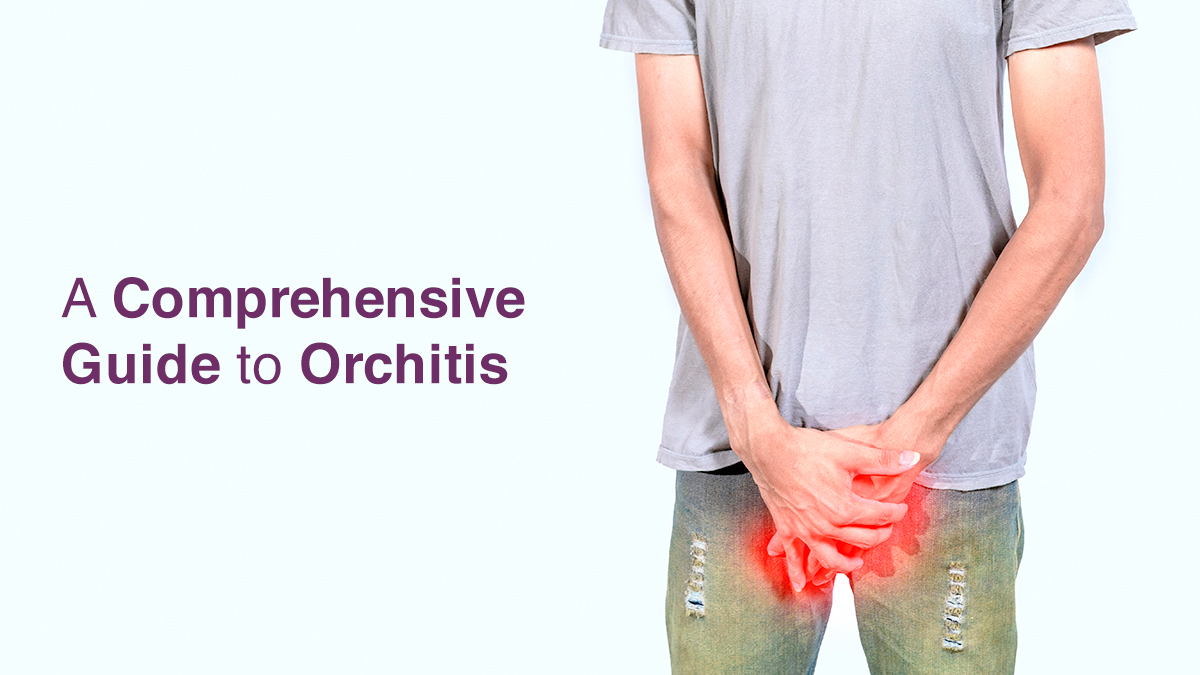Testicular health is an important part of men’s general well-being, and being aware of common issues and performing self-examination can help with early detection and quick treatment. Ignoring pain or swelling can result in illnesses such as orchitis, an inflammation of the testicles. If left untreated, it might lead to difficulties like fertility issues.
What is Orchitis?
Orchitis is inflammation of one or both of a man’s testicles, typically caused by an infection. It can be due to the spread of bacteria from another part of your body into your bloodstream. It can also be a result of epididymitis, an infection of the tube that moves sperm from your testicles. This is known as epididymo-orchitis.
Causes of Orchitis
Orchitis, which does not involve epididymal inflammation, is mostly caused by a viral infection that enters the testes via the bloodstream. The mumps virus causes the majority of these infections.
Bacterial infections are most commonly responsible for epididymo-orchitis. The most common reason for sexually transmitted infections (STIs) among adolescent guys and young men is gonorrhea or chlamydia bacterium.
Symptoms of Orchitis
Symptoms can be moderate or severe. It can occur in both testicles, although it usually affects only one. When it occurs, it usually resolves within two weeks.
Common signs of orchitis are:
- Semen containing blood
- Testicular pain
- Fever
- Groin pain
- Discharge from the penis
- Pain during intercourse
- Pain during ejaculation
- Pain during urination
- Scrotal swelling
- Sensitive, enlarged groin area on the affected side
Diagnosis of Orchitis
Various diagnostic tests are used to confirm the diagnosis of orchitis. The standard technique for diagnosing orchitis includes a detailed review of your medical history and the following tests:
Physical examination:
Your healthcare provider may perform a physical examination to evaluate the severity of the infection. They may push a finger into your rectum to physically inspect your prostate to see whether it is inflamed or not.
Ultrasound:
An ultrasound is performed on the affected testicle to assess whether the inflammation and pain are caused by orchitis or another medical disease. It can rule out testicular torsion.
Rectal examination:
A rectal examination is performed to see if there is a prostate infection. This is an important element of orchitis treatment guidelines because if the infection affects the prostate, antibiotic treatment will need to be continued for an extended period of time.
Urinalysis or urine test:
It involves testing a urine sample for STDs or other microorganisms that could be the source of the infection.
Blood Test:
If a sexually transmitted disease is suspected, a blood test is performed to screen for syphilis and HIV.
Treatment Options for Orchitis
Without treatment, orchitis symptoms usually subside after a few days. However, the swelling may take weeks or months to subside completely.
If orchitis is due to a bacterial infection or an STD, treatment is required, including needing 10 to 14 days of oral antibiotics. If the illness is an STD, your partner will also need STD treatment.
What is the care I can take for orchitis at home?
- Avoid having sex or moving heavy objects while you recover.
- Alternate applying an ice pack wrapped in a towel and a heating pad to the scrotal area.
- Rest as much as possible.
- Take nonsteroidal anti-inflammatory medicines (NSAIDs) to reduce swelling and pain.
- Wear a jockstrap to support and immobilize your scrotum area.
Potential Complications of Orchitis
Some boys who develop mumps-induced orchitis will experience testicular atrophy. Orchitis may also result in infertility.
Other potential issues are:
- Chronic epididymitis
- Death of testicular tissue (testicular infarction)
- Fistula on the skin of the scrotum (cutaneous scrotal fistula)
- Scrotal abscess
Torsion of the testicular blood vessels can cause acute pain in the scrotum and testicles. This is a medical emergency requiring rapid surgery. An enlarged testicle that causes little or no pain may indicate testicular cancer. If this is the case, you should undergo a testicular ultrasound.
Preventing Orchitis
To help prevent orchitis:
- Get vaccinated against mumps, which is the most prevalent cause of viral orchitis.
- Practice safe sex to avoid STIs that might cause bacterial orchitis.
- If you are having difficulty urinating, consult your healthcare provider. This could indicate a blockage or another problem that causes orchitis.
When to Seek Medical Attention?
Seek medical attention if you have significant discomfort or swelling in your testicles, scrotum, or groin, especially if it happens quickly. Other alarming symptoms include fever, blood in the sperm, painful urination or ejaculation, unusual discharge from the penis, or chronic groin pain. Also, seek emergency medical attention if the affected area becomes red, heated, or sensitive, or if you see scrotal lumps. Early medical intervention is critical for avoiding consequences like testicular injury or infertility. If you suspect a sexually transmitted infection (STI) or are having difficulties urinating, contact your healthcare practitioner right away for an evaluation and treatment.
Conclusion
Orchitis, whether caused by bacterial or viral infections, requires prompt medical intervention to avoid potential issues including infertility or testicular injury. Taking preventive steps, such as vaccination and safe sex, can help lower the likelihood of acquiring this illness. You can get more information about acute and chronic orchitis from the fertility specialists at Oasis Fertility Clinic near you. You can also get more details by calling 1800-3001-1000 or using our live chat.

